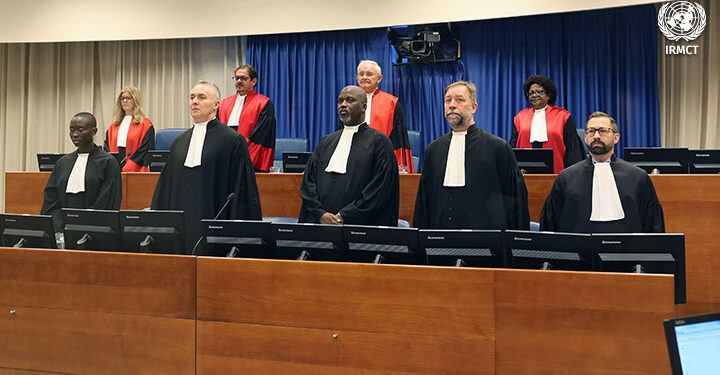Félicien Kabuga, one of the alleged financiers of the 1994 Rwandan genocide, skipped court as his trial for genocide and crimes against humanity started before the United Nations’ International Residual Mechanism for Criminal Tribunals in The Hague on Thursday, September 29, 2022.
Presiding Judge Iain Bonomy said Kabuga, who is facing six counts, is in good health but has decided not to attend the proceedings either in person or using the video conferencing telecommunication available to him.
According to a statement dated September 28, 2022, Kabuga, through the Larochelle Avocats law firm, accused the Mechanism of systematic denial of his right to his own counsel.
It explained that since January 2021, Kabuga has been trying to withdraw his current counsel’s assignment and have him replaced with a lawyer of his choice. “Despite all his efforts, the trial chamber, seized of his case continues, even on the eve of the opening of his trial, to impose a counsel in whom Mr Kabuga has no trust, and who is not discharging his professional responsibilities towards Mr Kabuga.”
“The chamber has decided that the appropriate course to take in these circumstances is to proceed with the trial nevertheless,” said Judge Bonomy.
Kabuga had earlier expresses his concerns about his current counsel, Emmanuel Altit, whom he accused of failing to provide case information and documents to him and his family. Kabuga had requested that Altit be replaced by Peter Robinson, a lawyer long familiar with Rwandan cases before the International Criminal Tribunal for Rwanda.
In its decision on August 26, 2022, the trial chamber denied Kabuga’s request to change counsel stating that the claims of a persistent breakdown and resulting complaints regarding the accused’s involvement in the preparation of his defence seem to result from Kabuga’s perception of a lack of communication rather than from any specifically identified action or failure on the part of his assigned counsel.
“The lawyers who have been presented as alternatives to Mr Altit were first given mandates supported by Kabuga’s family. Specifically, Mr Larochelle was put forth as an attorney to act on behalf of Kabuga until the family subsequently withdrew this mandate in favour of Mr Robinson. Mr Robinson has since withdrawn his representation of Kabuga’s family, after having filed ex facie fraudulent documents on behalf of certain members of Kabuga’s family in a proceeding before the Mechanism,” said the chamber.
It added that Robinson and those members of Kabuga’s family are now the subjects of an ongoing contempt investigation.
Kabuga’s trial at the International Residual Mechanism for Criminal Tribunals (IRMCT) starts 28 years after the genocide because Kabuga was in hiding for decades.
In its opening statement, the prosecution said Kabuga had played a substantial role in the 1994 genocide against the Tutsi.
“Kabuga didn’t need to wield a rifle or a machete at a roadblock; rather he supplied weapons in bulk and facilitated the training that prepared the Interahamwe to use them,” Prosecutor Rashid S. Rashid told the court.
The prosecutor further stated that Kabuga did not need to pick up a microphone to call for the extermination of the Tutsi on radio; rather he founded, funded, and served as president of Radio Television Libre des Milles Collines (RTLM), which broadcast genocide or propaganda across Rwanda.
He added that Kabuga led efforts to establish RTLM as a mouthpiece for anti-Tutsi propaganda while Interahamwe were indoctrinated in similar messages.
The prosecution said Kabuga used his vast wealth to set up hate media that urged ethnic Hutus to kill rival Tutsi, whom he referred to as “snakes”, and supplied the Interahamwe militias with machetes to carry out the killings. “He promised money, equipment, and vehicles to fight the Tutsi.”
The prosecution argued that Kabuga made two primary contributions to these crimes, first by creating and operating RTLM and second by financing, arming, and supporting the Interahamwe militia.
The prosecutor further argued that the evidence to be presented during the trial will show that “Kabuga, acting in the cause of extremist beliefs, played a key part in bringing about the crimes and the almost unimaginable suffering that was unleashed across Rwanda in 1994”.
Kabuga is facing charges of genocide; direct and public incitement to commit genocide; conspiracy to commit genocide; persecution on political grounds; extermination; and murder, all considered as crimes against humanity, committed in Rwanda in 1994.
According to the indictment, between April 6, 1994, and July 17, 1994, genocide against the Tutsi ethnic group occurred in Rwanda. At the time, there were widespread and/or systematic attacks against the civilian population based on Tutsi ethnic identification and/or political grounds.
“This trial will also be an opportunity to remind the world again of the grave dangers of genocide ideology and hate speech. Kabuga had a central role in provoking hatred of Tutsis, dehumanising innocent civilians and paving the way for genocide. If we are to prevent further genocides, all of us must be vigilant against such incitement. Ethnic, national, racial, and religious hate speech is not hard to identify – what is needed is the will to stop it in its tracks,” IRMCT Prosecutor Serge Brammertz said in a statement after the commencement of the trial.
Kabuga’s case is before Judge Bonomy, Judge Elizabeth Ibanda-Nahamya, and Judge Mustapha El Baaj. Judge Margaret Deguzman is the serve judge.
Kabuga, now 89 years old, was arrested in France in May 2020 after more than 20 years on the run. He pleaded not guilty to the charges on November 11, 2020. He is in the custody of the Mechanism’s detention unit in The Hague.







